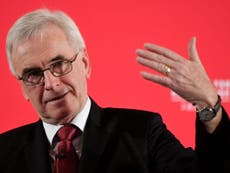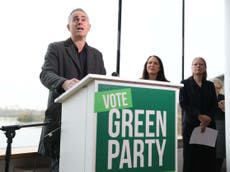Labour's plan to tackle the climate crisis by delisting polluters will achieve little – there are better ways
Any attempt to fight this threat is better than none, but this announcement is essentially messaging dressed up as policymaking

John McDonnell’s pledge to force carbon polluters to delist their shares from the London Stock Exchange exemplifies everything that’s wrong with British politics.
Superficially it looks good. It tells the corporate bad boys who are turning the planet into a cooker to clean up or clear off. It helps to delegitimise the carbon economy. What’s not to like?
As someone who’s advocated for more radical policies on the climate crisis, and more progressive action from business, you might think I’d fall in behind it.
But here’s the problem: It’s messaging dressed up as policymaking, same as the Tories’ “get Brexit done” slogan.
If you spend even five minutes thinking about the practicalities, it starts to creak. Same as… you guessed it.
Let’s say you press ahead with it and end up telling FilthyCarbonPolluter plc to hop it. Here’s what what will likely happen:
[We move to CEO Freddie Fatcat’s sumptuous office. His PA has just got his school chum Cedric Cityboy, who works for BigInvestmentBank Brothers, on the line.]
Freddie: “Cedders, these dreadful Labour chappies are threatening to kick us out of London. Dash it all, Freddie Junior’s starting at Eton next month and they’ve just put the fees up again. Could you help?”
Cedric: “Don’t you worry old man! There are plenty of stock exchanges where they’d be only too happy to have you. Some of them are in places where they’re seemingly still denying the climate crisis even exists. It’ll be a bit rum for a few months, you’ll have some forms to fill in and some investor roadshows to do. But after we get your shares moved across you can pollute away to your heart’s content.”
Freddie: “Really? Super. I knew I could rely on you.”
Cedric: “Always Freddie. Now, shall we talk fees? My holiday home is a bit too close to the coast for comfort. I could do with this year’s bonus being big enough to buy somewhere on higher ground so the family doesn’t have to worry about the rising sea levels you lot are helping to create ha ha ha!”
[Six months later, FilthyCarbonPolluter plc is no longer worrying about its London listing and has even dropped the plc having domiciled itself offshore.]
Now, I think McDonnell takes the issue of the climate crisis seriously. I also think he’d do a much better job at driving improvement than his opposite number Dominic Cummings, sorry, Sajid Javid, who nominally holds the title of Chancellor. But this isn’t the way to do it.
If the improvements he’s gong to demand from bad carbon companies are easier for them to bring in than moving exchange, they’re not going to amount to very much.
But let’s say they’re tough, and McDonnell ends up kicking some companies out to prove this is more than just a threat. The worst 1 per cent. That doesn’t get us very far either. We all get to feel self-righteous and good about ourselves. But there’s no more leverage. No more means of bringing pressure to bear on those businesses. And at the end of the day they’re still the worst 1 per cent. Sure, they don’t have the benefit of a London listing. But the prestige of that isn’t what it was given the way Boris Johnson has been trashing Britain’s international standing.
There are plenty of alternatives for cleaning up the planet and the City if that’s McDonnell’s aim. You could reform the system of corporate governance to push the climate crisis up the boardroom agenda by, say, requiring that companies produce a carbon audit and then giving shareholders a binding vote on it. You could also force the big institutions to publish their voting decisions (I can just hear the squeals that would result).
Of course, when it comes to the electorate that takes a bit of explaining. It’s doesn’t make for an easy sound bite.
You could reform the tax system, bring consideration of climate policies into the way public contracts are awarded.
There are options if your aim is to achieve something.
This proposal won’t do that. It’s the policy equivalent of Nick Kyrgios. Like the bad-boy Aussie tennis player, it catches the eye, makes a lot of noise but ultimately achieves… not very much.






Join our commenting forum
Join thought-provoking conversations, follow other Independent readers and see their replies